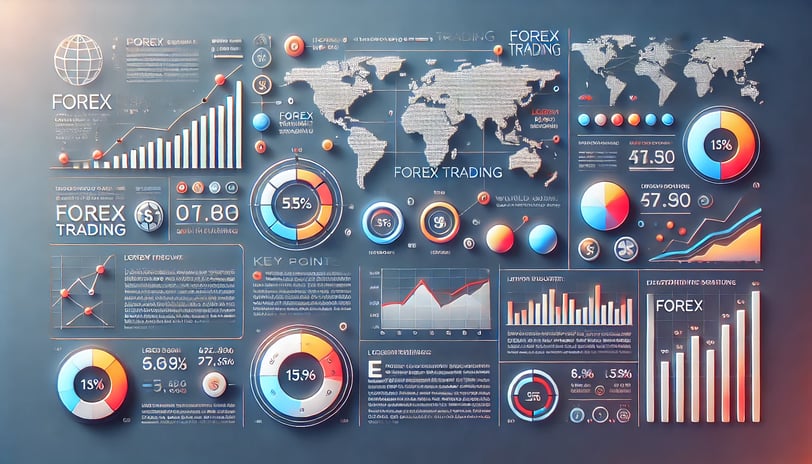How to Start Forex Trading: A Beginner's Guide
Last year, I made a decision that changed how I think about money forever. It wasn’t about saving more or spending less—it was about learning to make my money work for me. That’s when I stumbled upon forex trading. At first, I had no clue what I was doing. The words "pips," "leverage," and "currency pairs" sounded like a secret code. But I was curious. I thought, "If so many people are diving into forex, why not me?" What I’ve learned since has been both challenging and rewarding, and today, I want to share my journey with you. If you're someone who’s ever wondered how to start trading forex, you’re in the right place. I’ll break it down step by step, just like I wish someone had done for me when I began. If you're someone who’s ever wondered how to start trading forex, you’re in the right place. I’ll break it down step by step, just like I wish someone had done for me when I began.
Ravinder Kumar Sharma
12/6/20243 min read


Understanding the Basics
When I first started, I made the classic mistake of diving in without knowing the rules of the game. Trust me, that’s a fast track to confusion and frustration. Forex trading, or foreign exchange trading, involves buying one currency while selling another. It’s a 24-hour market where currencies like the USD, EUR, and JPY are traded in pairs. For example, the EUR/USD pair represents the Euro and the US Dollar.
I remember spending hours trying to figure out what "currency pairs" meant. It clicked for me when I thought of it like a simple barter system: "If I trade apples for oranges, how many oranges can I get for one apple?" In forex, the "apples" and "oranges" are currencies.
Here’s a cool fact: the forex market is the largest financial market in the world, with over $7.5 trillion traded daily (source: Bank for International Settlements, 2022). This blew my mind because it means the market is always buzzing with opportunities.
Lesson learned: Before you even think about trading, spend time learning the basics. Platforms like Babypips.com are gold mines for beginners. Start small and don’t rush.
---
Choosing the Right Platform and Tools
Now, this is where I messed up big time. I started trading on a platform just because it had flashy ads and promised "easy profits." Spoiler alert: there’s no such thing as easy money in forex. What I’ve learned is that choosing the right broker is like choosing the right pair of shoes—it has to fit your needs perfectly.
Here’s what you should look for in a broker:
1. Regulation: Make sure they’re licensed by reputable bodies like the FCA, ASIC, or CySEC.
2. Low Fees: Look for low spreads and commissions.
3. User-Friendly Platforms: I personally recommend starting with MetaTrader 4 or 5.
When I switched to a regulated broker, everything changed. Suddenly, I wasn’t worried about hidden fees or scams. Plus, the platform was so much easier to use. One feature I loved was the demo account. It’s like practicing a sport without risking any points. I spent weeks experimenting with fake money, and it taught me so much about strategy and discipline.
Pro tip: Spend at least a month trading on a demo account before going live. It’s like a free crash course in how not to lose all your money in one trade.
---
The Psychology of Trading
This one hits close to home because, honestly, it’s where I struggled the most. I’ll never forget my first live trade. I was so confident—I thought I had cracked the code. The trade went south in minutes, and I lost $50. My heart sank, and I swore I’d never trade again.
Looking back, I realize it wasn’t the loss that broke me. It was my mindset. Forex trading isn’t just about strategy; it’s about controlling your emotions. Greed, fear, and overconfidence can ruin you faster than a bad trade.
Here’s what helped me:
Set Stop-Loss Orders: This automatically closes a trade if it hits a certain level of loss. It’s like having a safety net.
Follow the 1% Rule: Never risk more than 1% of your account on a single trade.
Keep a Journal: I started writing down every trade—why I entered, how it went, and what I learned. It’s amazing how much you can improve just by reflecting.
Fun fact: Studies show that traders who journal their trades are 60% more likely to be profitable (source: Trading Psychology Research, 2023).
What I’ve learned is: Forex trading is as much about self-discipline as it is about market analysis. The market doesn’t care about your feelings, so you have to stay level-headed.
---
Conclusion
Forex trading has taught me so much more than just how to make money. It’s taught me patience, discipline, and the importance of continuous learning. Sure, I’ve had my fair share of losses, but I’ve also had wins that made it all worth it.
If you’re thinking about starting, my advice is simple: don’t rush. Take your time to learn, experiment with a demo account, and, most importantly, understand your emotions. Forex trading isn’t a get-rich-quick scheme, but with the right mindset and strategy, it can be incredibly rewarding.
So, what’s stopping you? Open that demo account today and take your first step into the fascinating world of forex. Who knows—this might just be the start of something life-changing.
---
Do you have a story or tip about starting forex trading? Share it in the comments—I’d love to hear from you!
Thankyou For Reading:)
